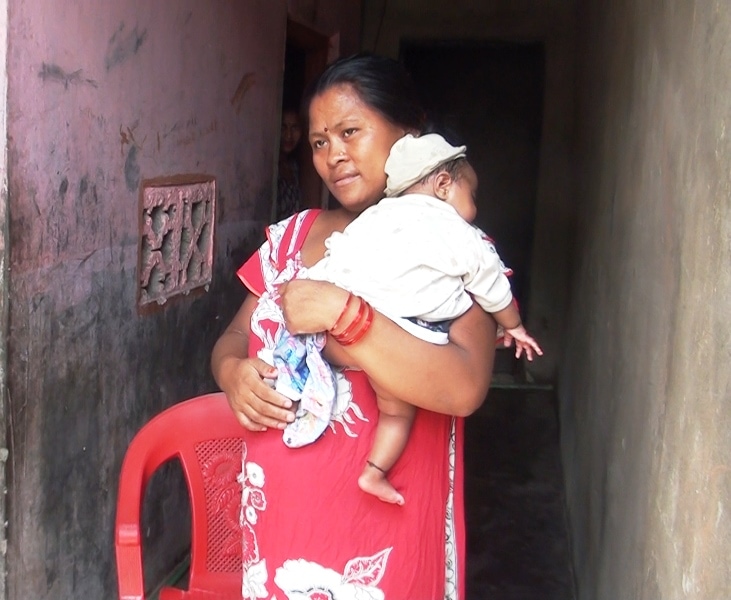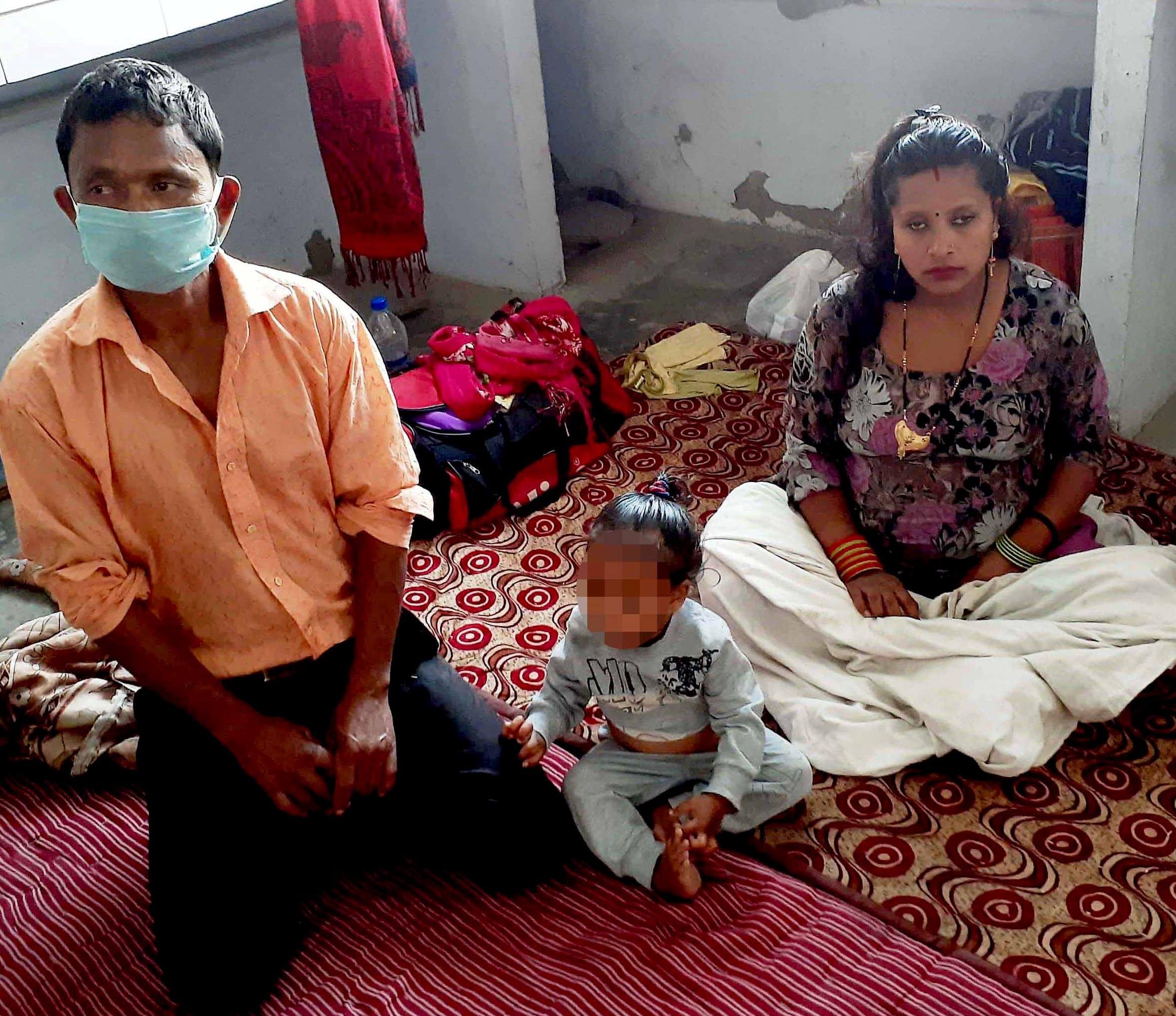The fear of Covid-19 has put the lives of mothers and their babies at risk while giving birth at home. Between March 24 and mid-July, 21 mothers and 51 newborns have died in Province 5 alone.
Amrita Anmol: Centre for Investigative Journalism-Nepal

Sumita Suwal from Durganagai, Butwal-11, has been subjected to starvation on pregnancy. Photos: Amrita Anamol
Meena Bhuj of Krishnanagar Municipality, Kapilvastu went to the city’s health centre on March 31 after following labour pains. Health workers at the centre did not attend to her, and told her to go to Butwal or Bhairahawa instead. She was rushed to Lumbini Regional Hospital, Butwal on an ambulance on April 6. She gave birth at the hospital without having to go through surgery or any other complicated treatment.
Bhuj was forced to visit the provincial hospital as the health centre near her house declined to look at her. Meena’s husband Jagendra said, “We spent a lot of money, and suffered a lot. If the local health workers had attended to her, we would not have had to go through such pain.”
The local health centre can deliver babies if the case is not too complicated. However, they have been reluctant to do so under the excuse of the coronavirus epidemic. This shows the extent to which women in rural areas are suffering during their labour pains.
Even hospitals under the provincial government don’t seem to be sensitive in the matter of obstetrics. The pain Sita Sharma of Durbar Rural Municipality-5, Gulmi, faced is an example of that.
On April 9, when she had labour pains, her husband Amrit Poudel took her to the district hospital in Tamghas. The hospital suggested that a surgery be conducted and said that as there would be problems due to the coronavirus epidemic, she be taken to Palpa or Butwal.
When Sharma was taken to Lumbini Medical College in Palpa, hospital authorities refused to admit her citing the coronavirus menace. After that, she was taken to Siddhartha Hospital, for Children and Women in Butwal. Officials there also refused to admit her. Finally, she was admitted at the Lumbini Provincial Hospital. She gave birth to a child through surgery on April 11. “Even when I was in pain, I was not admitted. The hospitals are very ruthless,” said Sita. “I had to seek help from four hospitals, and that created a lot of trouble.”
To know the extent to which pregnant women and nursing mothers have been neglected at the local level, one has to look at the quarantine centres established under partnerships between local governments and the provincial government. There are no special provisions for pregnant and nursing women. Meena Kahar of Yashodhara Rural Municipality-2, Kapilvastu, who stayed in one of the quarantines from March 28 to April 15, said, “I was seven months pregnant and I was looking after another 18-month-old child. But the facilities I received were similar to those for a normal person. ” However, rural municipality chair Grijendra Pandey said, “I couldn’t think of others as I was faced with the challenge of providing shelter and food to those living in quarantine and isolation.”
Pregnant women and new mothers staying in the quarantine of Kapilvastu Municipality, Kapilvastu, complained that they did not even get enough to eat. Some women and human rights activists raised their voices saying women had to live in their own pool of blood due to lack of sanitary pads. However, the municipality could not arrange anything else other than the food and accommodation for them. Nirmala Pasi, who was in quarantine in Kapilvastu from March 29 to April 14, said, “We went through a lot of pain.”

Bhagwati Pariyar, from Resunga Municiapality-2 Gulmi stranded for 4 days in Bahaliya, border area.
There are 102 isolation centres for corona patients in Province 5. There are no separate provisions for pregnant and nursing mothers in all of them. A woman from Butwal-11 was confirmed to have contracted the coronavirus infection on August 13. She went to the ANFA Isolation in Butwal with her months-old and six-year-old children. “There weren’t any proper arrangements for food and accommodation. I was shocked and returned home in four days,” she said. “My children also contracted the infection seven days after we returned home.”
Pregnant women and nursing mothers were also not prioritised when essentials were distributed by the local government. Samamarimai Rural Municipality, Rupandehi, distributed food worth Rs 7 million to all households. However, pregnant and nursing women’s needs were not recognised.
The municipality did not provide maternity services at its three health posts from March 24 to the end of April. Health post chief Prasad Majhi said that maternity services could not be provided due to lack of safety equipment for health workers.
Sainamina Municipality, Rupandehi, distributed essentials worth Rs 5.18 million in its area from March 28 to the second week of July. It said that 5,874 families received food items including pulses, rice, salt and oil under the programme.
However, the relief couldn’t reach the needy pregnant and nursing women. According to the health department of the municipality, 400 pregnant and nursing women have been identified in the area since March 24. Of them, 150 are from poor families. Mayor Chitra Bahadur Karki said that relief was distributed to the needy as per recommendations from the neighbourhood development bodies and ward members.
Butwal sub-metropolis distributed relief for some poor nursing mothers from April 13 to May 13. “We provided some help to the nursing mothers. But due to the lack of programmes targeted at them, we couldn’t provide significant help to pregnant women, ”said Deputy chief Gumadevi.
Shivraj Subedi, provincial coordinator of the Association of Municipalities and chief of Butwal sub-metropolis, said that the local government has been unable to pay attention to pregnant and maternity services as they have been under a lot of burden.
He said, “The federal government gave a public holiday to its employees and provincial officials didn’t provide much help. It was difficult for the people’s representatives to set up quarantine and control the transmission of the infection. So nothing could be done for pregnant women and nursing mothers. ”
Urmila Bhuj of Krishnanagar Municipality-4, Kapilvastu, was diagnosed with coronavirus infection in the first week of June. The municipality sent her Toulihawa to the district hospital on June 15 even before her labour pain started, saying that her case is risky.
She was sent directly to Bhim Hospital in Bhairahawa, where she was kept for four days. However, it didn’t deliver the baby.
She was then told to go to Kathmandu or Nepalgunj saying that it would be difficult to perform a surgery as the delivery date was fast approaching. On June 20, she was taken to Nepalgunj Medical College, Kohalpur, where she gave birth to a baby girl the same day. She was discharged on the 27th as both the mother and her baby were in good health. “Thankfully, I didn’t die,” says Urmila. “But going to one place from another was exhausting.”
Urmila didn’t show any symptoms of the corona infection. She could have given birth without surgery. However, Bhim Hospital refused to do so. Gopal Upadhyaya, information officer at the hospital, said, “The hospital doesn’t have the necessary infrastructure to assist an infected woman deliver her child. So we couldn’t take the risk. ”
Article 38 of the constitution states that every woman shall have the right to safe motherhood and reproductive health. Similarly, Article 3 states that women have the right to special opportunities in education, health, employment and social security on the basis of positive discrimination.
However, in the case of the corona epidemic, the constitutional right is far-fetched for pregnant and nursing mothers, who haven’t even received basic care. Rights activist Dr Renu Adhikari said, “Except for those with complications, infected women can deliver babies at other hospitals. Doctors and hospitals need to be made aware of this.”
Another example of the pain pregnant women have to go through is the experience of Rachna Pandey, 28, of Butwal, Naharpur. Pandey was rushed to Lumbini Provincial Hospital on August 17 following labour pains. She and her husband Umesh Kunwar tested positive for coronavirus at the hospital. After that, doctors and health workers started running away from them, rather than treating her.
After she was infected with coronavirus, the doctor suggested that she go to Nepalgunj Medical College, Kohalpur or to Kathmandu. After testing positive for coronavirus, her husband went into isolation while mother-in-law went home with her another child. Thinking that it would be easier to go to Kohalpur than to Kathmandu, she finally decided to go to Kohalpur. She gave birth to a baby girl on August 22.
“I could neither get treatment close to home, nor get an ambulance easily to come to Kohalpur. I had never faced this much trouble, ”she lamented. Dr Rajendra Khanal, medical superintendent at Lumbini Regional Hospital, said Pandey had to be sent to Nepalgunj as the hospital didn’t have the infrastructure to operate on a Covid-19 patient. He said that the provincial hospitals are under a lot of stress as the health centres at the local level haven’t been attending to normal cases.
Dr Jageshwar Gautam, head of the Health Coordination Division at the Ministry of Health and Population, said the government designated three hospitals for pregnant women with Covid complications. “But this was understood in the wrong way. Local hospitals thought all pregnant women who contract the infection need to be sent to these hospitals. So we have done away with the arrangement.”
“Now, Paropakar Maternity Hospital in Kathmandu has started delivery services even for infected women who need surgery.”
The number of women giving birth at home has increased in recent times as hospitals refuse to attend to them due to the fear of Covid-19. This has led to an increment in maternal and infant mortality. According to the Directorate of Health, 21 mothers have lost their lives and 51 newborns have died in Province 5 alone between March 24 and mid-July.
According to a report released by the provincial government last year, 25 percent of women in the province give birth at home. After the onset of the corona epidemic, the number has gone up to 40 percent, said Dr Vinod Raj Giri, director at the provincial health directorate. “There are complaints that many local maternity centres are not providing services due to the fear of coronavirus. That is why there has been an increase in the number of unintended pregnancies and deaths at home,” he said.
There are 363 birthing centres in the province that provide safe maternity services round the clock. Apart from this, 32 health institutions have basic and 14 have emergency maternity and neonatal care centres. However, in most of these settings, maternity services are not easily available due to the coronavirus epidemic.
Province 5’s Minister for Social Development Sudarshan Baral said that maternity services have started at Lumbini Provincial Hospital from the first week of September. He said, “We have heard countless reports of pregnancy and maternity problems at home, on the streets and in quarantine. However, we could not provide direct assistance. We asked local government and partner organizations to provide help.”



